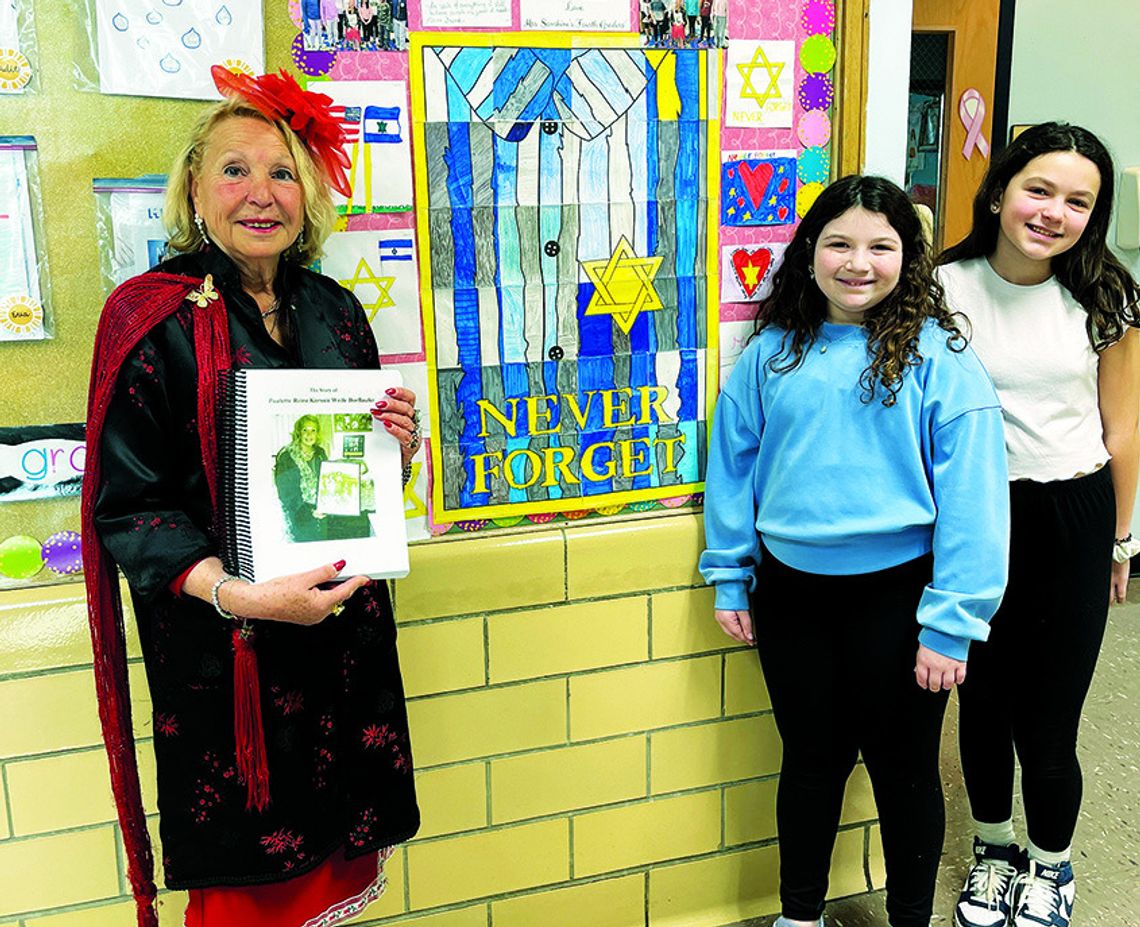Paulette Dorflaufer, Livingston’s stylish, congenial and attentive crossing guard, is called “Miss Paulette” in Burnet Hill School, where she shows her devotion to children in her role as a three-hour-a-day aide in the classroom, lunchroom, and playground.
A few weeks ago, fourth grade teacher Julie Sonshine invited Dorflaufer to share with her class her story about surviving the Holocaust. At the time, students were reading nonfiction books about this dark period in history, and had questions about Anne Frank, Nazi Germany, and World War II. Dorflaufer, always willing to speak about her experiences and about the Holocaust, read excerpts from her book, told stories, and answered the children’s questions about her journey – from her rescue and life in a French orphanage as a Jewish child to her subsequent adoption and immigration to the U.S. aboard the Queen Elizabeth I in 1948. They asked if she remembered her parents and what schools she attended.
“The children couldn’t get over the story,” Dorflaufer said. “They were happy I was there to tell them what I went through. They really listened.”
Dorflaufer, born in Marseille, France, in 1943, was the youngest of ten children. When she was a year old, she told the children, “I was in the hospital. When the Gestapo came looking for me, A nurse rescued me, yelling ‘Give me back my daughter,’ who fortunately had the same name, and they threw me to her. I often tell my children, I am the chosen one.”
She was put in an orphanage. “There the nuns took care of me,” she said. “Every time I see a nun, I have to hug them. We didn’t have much; an apple was a treat… The Jewish children had to hide underground when the Nazis came, and it was scary.”
Dorflaufer’s book is a large, spiralbound chronicle of her life. It touches on the loss of her birth family; her experiences in the orphanage; her adoptive family; reuniting with several siblings decades after the war ended; sharing in “twin with a survivor” programs at various synagogues; her speaking engagements; official accounts of family members during the war years and after; and her beloved children and grandchildren.
She recently updated the book to include letters that the students wrote her after she spoke with them. Many asked her more questions and invited her back, said teacher Sonshine. Several expressed sorrow that she “had to experience something so brutal,” as one student wrote. “I will never forget the very sad Holocaust,” said another. “The Holocaust was one of the most horrible events in history. I’m sorry that you had to go through it.” “I feel bad that in the orphanage you had to hold on to your food so nobody will steal it.”
Many students also asked if they could draw pictures for Dorflaufer.
“I was so touched by how much my class got out of this experience that I decided to share it with the school,” said Sonshine. “I dedicated part of our bulletin board to the pictures and artwork that we created, and I have gotten so much positive feedback from staff and students.”
Dorflaufer is an aide at Burnet Hill, from 10:30 a.m. until about 1:30 p.m.
“But first, I go crossing at 7:20 a.m. on Northfield and Hillside, until 8:15. At 2 p.m. I am at Hillside School, ‘on the bottom,’and back on Northfield at 3 p.m.” Then there are the evenings she can be seen dancing in various establishments. “I love it all,” she said. “I want to be busy. Why do I have to stop?”
In her fur coat, smart shoes, and chapeau, Dorflaufer is always cheerful, animated, warm and friendly, and thrilled to greet people. “In the orphanage, I had nothing,” she recalled. “But when I left, they gave me a white rabbit fur coat and muff. I guess I have fur coats and muffs because of that. And I was inspired by my Aunt Ruth, who gave me my first white mink coat.”
She has long been involved in telling her story to schools, universities, and religious and other organizations, reminding people to Never Forget the Holocaust.
Through her words and actions, Dorflaufer emphasizes the importance of gratitude, resilience, and optimism.
“We must never forget this tragedy. Our stories must live on through the following generations,” she said.




